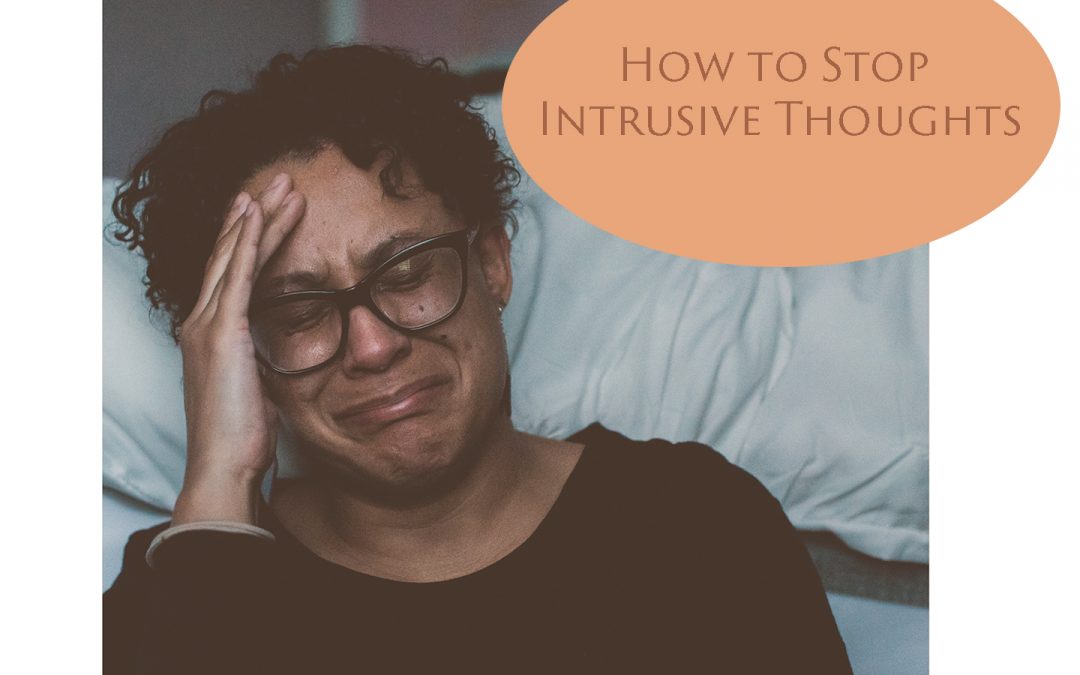What are intrusive thoughts? Where do they come from? And what can you do to stop intrusive thoughts?
Every single person on earth has intrusive thoughts.
In fact, a 2014 study at Concordia University showed that a whopping 94% of people experience intrusive thoughts on a daily basis. 1
But while some people are able to ignore them and move on, for those who are big-hearted and sensitive intrusive thoughts can be extremely distressing and turn into an obsession.
And it’s when intrusive thoughts turn into obsessive thoughts that problems arise.
What are intrusive thoughts?
Intrusive thoughts are unwanted and often repetitive thoughts that disturb your inner peace.
And they can take many forms.
Sometimes intrusive revolve around fears for the future or stressful memories from the past.
Other times intrusive thoughts center on violence or what you perceive to be inappropriate behavior.
Here are some common examples of intrusive thoughts:
New parents often have intrusive thoughts about harm coming to their children, or that they themselves will harm their children.
People in their first safe relationship might obsess over whether or not their partner is “the one,” with an accompanying fear that they will cheat in the future or that they’ll be cheated on.
A woman with a history of miscarriage might find herself with intrusive thoughts that revolve around sexual taboos that she’s afraid she’ll act on.
Someone else might be afraid of being on a balcony, roof, or bridge, for fear that they’ll jump off the edge.
The list goes on.
Interestingly, while all of these intrusive thoughts look very different on the surface, they all have one thing in common.
They’re all trying to keep you safe.
And the reason they feel so bad is because they are imagined scenarios that go against your core values and the image you have of yourself.
You feel distraught because you want to avoid the outcome you imagine will come if the intrusive thought manifests in physical reality.
This distress is rooted in your nervous system.
When you have an intrusive thought, your nervous system goes into high alert and activates a stress response.
But lucky for you, your nervous system is constantly shifting, and it’s something you can consciously choose to heal by replacing old patterns with new ones.
This means, by learning how to regulate your nervous system, over time intrusive thoughts won’t cause nearly as much stress in you.
And the first step is to turn down the volume of your thoughts so you can chill for just a sec and get some perspective.
One way to do this is to replace your intrusive thoughts with a couple of reminders.
Reminder #1: Thoughts aren’t real.
You are really having feelings in response to them, but thoughts can never tell you the whole truth about anything.
Reminder #2: The presence of intrusive thoughts doesn’t mean you’re a bad person or that anything’s wrong with you.
If anything it’s the opposite.
When intrusive thoughts cause distress it’s evidence that you’re more conscientious than most.
Someone who has an intrusive thought and brushes it off easily generally isn’t as sensitive to other people’s needs and welfare as someone who feels upset by intrusive thoughts.
That, or they are sensitive and have done the work to stop taking intrusive thoughts so seriously.
We’ll talk about how to do that in just a moment.
But before you can learn to stop intrusive thoughts, you have to understand why you’re having them in the first place.
All thoughts are conditioned from your past.
And the reason you have them is to steer your physical body away from pain and towards pleasure.
At the most basic level, this comes down to primal survival instincts.
Things that are painful often show you that there’s some threat to your survival, whether its the survival of your ego or your actual physical body.
Whereas things that are pleasurable feel that way because they are associated with an increased likelihood of survival.
(With plenty of exceptions, of course. There’s a ton of nuance here that we don’t need to get into right now).
Why do you have intrusive thoughts?
Just like every other thought, they’re planted in your consciousness based on events and ideas that you encountered in the past.
And your physical reaction of revulsion, fear, anxiety, or stress is your body’s way of trying to steer you away from the pain that your ego has associated with that intrusive thought.
Let’s take another look at the examples from earlier.
New parents want to keep their children safe, so they’re hyper aware of potential danger and their own strength relative to their child.
When someone has a history of dysfunctional relationships, it’s hard to recognize a healthy one, and it’s natural to fear that it will end in the same pain that was experienced in the past.
In the case of the woman who has had miscarriages, it’s possible her ego is trying to protect her from experiencing another loss by bombarding her with sexually taboo images that result in a fear of intimacy.
And someone who is afraid they will jump off high ledges is actually proving to themselves how much they love life.
But this is where the wires get crossed for a lot of sensitive folx.
Because when you’re sensitive you feel the shock of your reaction, of this survival instinct in response to the thought, even more strongly.
Instead of just a quick sprinkle of stress, you have a whole hurricane.
And when your nervous system goes into high alert with this amount of stress, your mind runs around like crazy trying to figure out how to get you out of it.
But this just causes more stress, because the source of your stress isn’t outside of you.
It’s in your mind.
And this means you’re more likely to start obsessing over intrusive thoughts that cause stress.
The problem is, thoughts can’t be controlled.
They just flow in and out of your awareness.
And the more you pay attention to any thought, whether it’s good or bad, the stronger the neural connections around that thought become.
So the more you push against a thought and try to make it go away, the more likely you are to think a similar thought in the future.
The unfortunate result of trying to control your thoughts is that you end up feeling even more out of control.
What can you do to stop intrusive thoughts?
Nothing.
And this is actually totally fine, because intrusive themselves thoughts aren’t the issue.
The thing that’s driving you crazy is your physical response when you think those thoughts.
And this is something you can change.
But it takes time.
Any neural wiring that’s associated with survival instincts is going to be extra strong.
This is where trauma comes from (trauma being any stressful event, big or small, that remains unprocessed and ends up lodging itself in your nervous system as a stress pattern).
And it takes a while to release trauma and convince your body that you’re actually safe now.
So be patient with yourself and don’t lose hope.
Remember: healing is always possible.
And in the case of intrusive thoughts, nervous system regulation is key.
Consistent routines and rituals can help to regulate your nervous system and tame that stress response throughout the day.
Start by creating a solid morning routine.
Click here to learn about morning routines that can help to support your mental health.
Then, as you move into your day, practice present awareness as much as you can.
When you practice present awareness (a.k.a. presence, a.k.a. mindfulness) you bring your attention out of the thought realm and into your body —or whatever you can focus on that’s present right here, right now.
Try it right now.
Pause for a sec and feel the aliveness in your hands.
You can also focus all of your attention on your breath, if it feels good to you.
Press your feet into the earth and notice how it holds you.
Observe the information your senses are giving you without labeling them.
There are lots of ways to practice presence.
The simplest one is just allowing yourself to be, here, now, without letting your thoughts cloud your perception.
Thoughts will come.
They always do, and it doesn’t mean you’re doing this wrong.
The practice here is to notice them, and then let them go so you can refocus entirely on the experience in the present moment.
And you can make this process automatic.
When you intentionally practice presence (also called mindfulness) as you perform specific tasks, you can condition yourself to fall into a state of present awareness whenever you do that task.
With practice, this will help you let go of intrusive thoughts so they don’t bother you as much.
Some good opportunities to do this include washing your hands, doing the dishes, watering plants, drinking a cup of tea, eating a meal, taking a shower.
It doesn’t really matter what you choose, but if you want to condition yourself consistency is going to be key.
Another way to quickly regulate your nervous system is to slow and deepen your breath.
When you are in a state of stress, your breath becomes quick and shallow so oxygen can be more easily pumped to your muscles.
This reaction is helpful if you need to run or fight your way out of a stressful situation, but it’s not as helpful if the stressful situation is inside of your own head.
When you slow and deepen your breath, on the other hand, you’re telling your body that you’re safe (because if you were in immediate danger you wouldn’t have time to focus on your breath).
Deep slow breathing is like pushing a reset button that shuts down your stress response.
This is because 80% of the fibers in the vagus nerve are afferent, meaning they run from the body to the brain. 2
And the vagus nerve is the main component of the parasympathetic nervous system, which is responsible for your ability to relax. 3
So when you relax your body by slowing and deepening your breath, your vagus nerve sends signals to your brain that you are safe.
And when your body feels safe, your thoughts relax too.
But a lot of people don’t actually know how to breathe properly.
Try this right now and see if you do.
Put your hand on your belly, and breathe in slowly, maybe for a count of 3 or 4.
As you breathe in, feel your lungs filling up and visualize diaphragm dropping down to make space for more air to come in (it’s like a tent that covers your belly from front to back, right at the bottom of your ribs).
This is going to make your belly expand out like a balloon, so your hand is going to be pushed out by your breath.
Hold at the top of the inhale for a few counts, and then breathe out even slower than you breathed in, feeling your belly relax beneath your hand.
Hold the exhale for a few counts, and then breathe in slowly again.
A few rounds of this and you will not only distract yourself from intrusive thoughts, you will also have turned down your stress response so your mind is less likely to look for something to worry about.
Now we’ve talked about the stress response, but what about the intrusive thoughts themselves?
Well, as we’ve already established, you can’t make thoughts go away.
Saying that you’re thinking intrusive thoughts is actually a really misleading play on words.
Because you’re not doing anything to think.
Thoughts appear, and then they go away.
But when you identify with thoughts, when you imagine that they define you, and when you believe that they are true, you’re setting yourself up for suffering.
And even though it’s insane to believe illusions, it is, in fact, what most people do.
In order to heal from intrusive thoughts you have to realize what thoughts really are.
You are not your thoughts.
Thoughts do not define you in any way.
And because thoughts are almost entirely based on faulty memories from past experience, they can never tell you the full truth in any situation.
When you stop taking your any of your thoughts so seriously, intrusive thoughts stop feeling so stressful.
And one of the best ways to stop taking your thoughts so seriously is through inquiry, allowing emotions to exist by fully feeling them, and then releasing them.
By allowing yourself to experience the stress that arises in response to intrusive thoughts you have the opportunity to consciously shift your response.
And this is how you can start to heal the trauma.
But it’s best done with guidance.
I teach my patients how to do this.
And their resilience is pumped up even further with personalized wellness plans that include acupressure, medicinal herb formulas, nutritional guidance, movement practices and coaching that covers other holistic mental health strategies to help with more than just intrusive thoughts.
Because mental health is rooted in the body.
Physical health is shaped by the mind.
And healing happens best when mind, body, and spirit are all taken into consideration.
Want to know more?
Then click here to email me now so we can set up a free consultation and find out if holistic mental health coaching is right for you.
I can’t wait to hear from you!
1. https://www.sciencedaily.com/releases/2014/04/140408122137.htm
2. https://www.sciencedirect.com/topics/neuroscience/vagus-nerve
3. https://www.ncbi.nlm.nih.gov/pmc/articles/PMC5859128/





